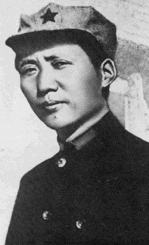Mao Zedong was born in 1893 and he died in 1976. Mao Zedong is considered to be the father of Communist China and along side Sun Yat-sen and Chiang Kai-shek played a fundamental part in China’s recent history.
|
|
Mao
Mao was born in Chaochan in Hunan province. He came from a peasant family. As with all peasants living in Nineteenth Century China, his upbringing was hard and he experienced no luxuries.
He first encountered Marxism while he worked as a library assistant at Peking University. In 1921, he co-founded the Chinese Communist Party. Mao gave a geographic slant to Marxism as he felt that within an Asiatic society, communists had to concentrate on the countryside rather than the industrial towns. In reality, this was a logical belief as China had very little industry but many millions involved with agriculture. Mao believed that a revolutionary elite would only be found in the peasantry and not among those who worked in towns.
With Zhou Enlai, Mao established a revolutionary base on the border of Hunan. In 1931, Mao set up a Chinese Soviet republic in Kiangsi. This lasted until 1934 when Mao and his followers were forced to leave Kiangsi and head for Shensi in the legendary Long March which lasted to 1935. Here they were relatively safe from the Kuomintang lead by Chiang Kai-shek but far removed from the real seat of power in China – Peking (Beijing).
From 1937 to 1945, the enmity between the KMT and the Communists was put to one side as both concentrated their resources on the Japanese who had launched a full-scale invasion of China in 1937. It was during this time that Mao developed his knowledge about guerrilla warfare that he was to use with great effect in the civil war against the KMT once the war with Japan had ended in 1945.
By the spring of 1948, Mao switched from guerrilla attacks to full-scale battles. The KMT had been effectively broken by the skill of Mao’s guerrilla tactics and defeat was not long in coming. In October 1949, Mao was appointed Chairman of the People’s Republic of China.
He governed a country that was many years behind the world’s post-war powers. China’s problems were huge and Mao decided to introduce radical solutions for China’s domestic weaknesses rather than rely on conservative ones.
From 1950 on Mao introduced land reforms and the first Five Year Plan started in 1953. Peasant co-operatives were set up. In 1958, the Great Leap Forward was introduced as were the first land communes. Though he used the term “Five Year Plan”, Mao did not accept the theory that all ideas had to start with Russia and China would have to follow. In fact, Mao remained very independent of Russia and publicly criticised the rule of Khrushchev when he became leader of Russia.
In 1959, Mao gave up the position of head of state. This went to Liu Shao-chi. He did remain party chairman and concentrated his efforts on ideological changes. From 1960 to 1965, a struggle took place between Liu and Mao over who were the more important – the industrial workers or the peasants. Mao still placed his faith in the peasants. Liu favoured the urban workers.
This clash formed the background to the Cultural Revolution of 1966 when Mao openly and successfully sided with the peasants. Mao had sheer numbers on his side as China was still an agricultural nation despite exploding an atomic bomb in 1964. From 1966 on, some essays by Mao entitled “Thoughts” became all but compulsory reading for Chinese people – especially the young who Mao actively courted. This was to become Mao’s famous “Little Red Book”.
Mao continually proved to the Chinese that he was fit to lead them by swimming miles down the Yangste River each year. He remained leader of China in the later years of his life though Zhou Enlai did much of the foreign policy work.
Mao’s death in 1976, plunged China into national grief.
